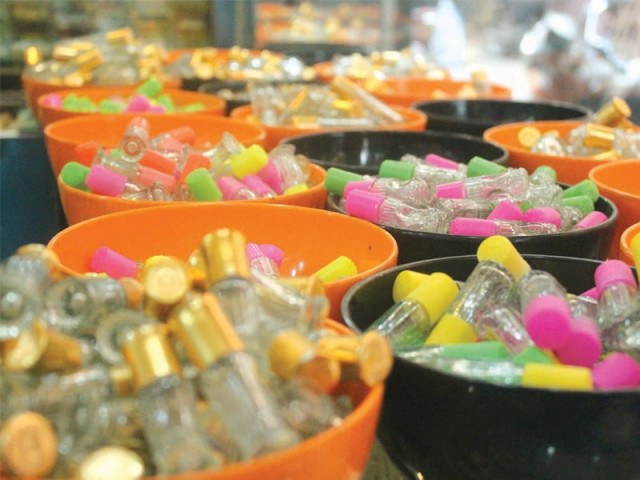Botal Gali: A street that should live again
Perfume Chowk may not smell very sweet, but Botal Gali lives up to its name.

Perfume Chowk may not smell very sweet, but Botal Gali lives up to its name. PHOTO: RIFFAT RASHID
That’s what happened when I, a hard-core Karachiite, went to Botal Gali, a narrow street tucked away in the heart of downtown Karachi. Real bottles in Botal Gali? I mean, I have never seen monkeys prancing around in Bandar road, found a single boat in the entire length of the Boat Basin or heard of anyone finding God in the Allah Waala Chowrangi. How was it that there were actual bottles in Botal Gali?

Maybe the thing about the place is that it’s one of those few places in Karachi where you get what you’re promised.
Back when Pakistan had just emerged in the subcontinent as a country in its own right, this area was busy being called Parsi Gali. No surprises there actually, for then the area was full of Parsi residents, most of whom had migrated from India. “There were barely any shops back then,” recalls one shopkeeper. The street gradually transformed from a thriving residential district to a commercial one, featuring shops selling all kinds of bottles — perfumes, medicines, beverages, you name it.

Of the many things that strike you once you eventually decide to set foot in the Gali is the overwhelming sense of nostalgia. Surrounded by colonial buildings and residents that have stories to tell, usually dating back to pre-partition times, you immediately mark this as a place that lives more in the past than the present. It’s more about what it could have been than what it is now.
The many facets of this street might not reveal themselves to a visitor all at once. The street, which on a deserted Sunday night, seems like a dark alley straight out of a horror film takes on a very different persona as it quietly goes about its business on a Monday afternoon.
What it could have been is debatable at best, but what it used to be, for sure, is a busy street where people would come to window-shop, look around and loiter about while they exchanged news about the latest happenings of the city with the shopkeepers. It was a street that was throbbing, awake, a street that lived.
Over time, as the buildings marked by colonial imprints aged, the street also fell into disrepair. Was it the lack of a sense of ownership among the residents? Possibly. Was it the increased use of plastic bottles that hindered the sales of these glass ones? Most likely. But primarily, the slow death of Botal Gali is due to that single defining characteristic of Karachi: crime.

“Robberies are so commonplace that we almost expect them to happen every day,” claimed one distressed resident while fixing his motorbike.
One could easily picture Botal Gali as a glamorous and well lit street attracting a horde of visitors from all over the city, mainly because there’s no other street like it. If nothing else, the street — if preserved — can serve as a living homage to our shared heritage, but since it has been left to fend for itself, all it has to offer are insecure residents and shopkeepers who remain more for the sake of emotional attachment than anything else.
“Where would I go? I have been here twenty years. My father and grandfather lived here,” was reason enough for a shopkeeper when asked if he’d like to move to someplace else considering the problems associated with the street.
And then, concerns like the lack of continuous electricity and water supply go a long way in making the place appear unfriendly to newcomers despite it being an everyday problem for most of the city. In spite of that, the residents are bent upon making ends meet and on public holidays and Sundays, you might even be lucky enough to see some of them playing cricket on the streets.
Among the things that can be done for this place include the provision of cost-effective and energy efficient light bulbs that could light it up night. While hardened robbers and dacoits are too experienced to be intimidated by the presence of a few hanging lanterns, it might succeed in at least warding off the newbie.
Moreover, a number of art and design students can volunteer to have some of the bottles designed and sold at a premium price. This money could directly go into the construction of the public space as a whole. While it’s definitely a place worth visiting at least once, interventions need to be put in place to make the street more accessible and welcoming to the general public.
After all, if a street gives you what it promises, it makes sense, sometimes, to give back.
Published in The Express Tribune, Sunday Magazine, February 3rd, 2013.
Like Express Tribune Magazine on Facebook to stay informed and join the conversation.



















COMMENTS
Comments are moderated and generally will be posted if they are on-topic and not abusive.
For more information, please see our Comments FAQ